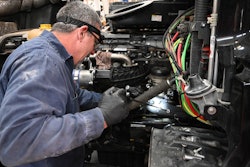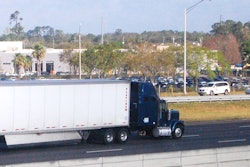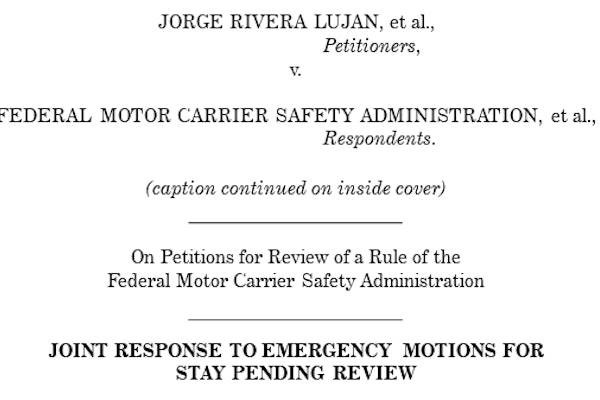
Trucking groups took another step last week in their challenge to California’s AB 5 contractor law, which effectively outlaws traditional owner-operator/carrier leasing models in the state.
After a series of delays that set the hearing back from an original date in May earlier this year, the U.S. District Court for the Southern District of California on Nov. 13 finally heard arguments from both sides of the case. The California Trucking Association and Owner-Operator Independent Drivers Association argued against the law, and the state of California and the Teamsters union defended it on the other side. CTA and OOIDA are seeking either an injunction to block the law from applying to trucking, or to have an exemption added for interstate trucking.
AB 5 was signed into law in 2019 and was intended to ensure workers who should be classified as employees were not incorrectly classified as independent contractors. AB 5 for the first time in the state codified a so-called “ABC test” for determining contractor classification. For trucking, the “B” portion of that test is particularly problematic, as it requires that a worker performs work outside the usual course of the hiring company’s business to be deemed a contractor. As a general rule, owner-operators leased to a trucking company fail to meet that standard.

Judge Roger Benitez, the officer of the court who gave trucking its preliminary injunction in 2020 when the law first took effect, still oversees the case, and heard last week’s arguments. (That first injunction was in place until June 2022, when the U.S. Supreme Court declined to hear the case, sending it back to the lower court.)
How Benitez might rule remains unclear, but his probing questioning during arguments alleging violations of federal law and impacts on interstate commerce offered observers at least some indication of where this challenge could land.
[Related: CTA, OOIDA mount new argument against AB 5 contractor law]
Paul Torlina, government affairs counsel for OOIDA, was in the courtroom Nov. 13 as an observer of the proceedings. He said Benitez asked several questions of defendants in the case about whether “any leeway or flexibility" was "offered or discussed” to give trucking some relief within the law. “The California attorney had to admit there had never been any tweaking of the law or offer to do so to make this go away for interstate trucking,” Torlina added, despite there being a number of carve-outs in the law for other groups of workers, including but not limited to app-based transport companies like popular ride-hailing services Uber and Lyft.
A number of questions from Benitez for California and the Teamsters “were pointed very much at the motivation to make people employees and take away” the leased owner-op business model, Torlina said.
One line of questioning that stood out may indicate which direction Benitez is leaning in the case. According to Torlina, Benitez asked the California attorney why, if no other states have this law, the state feels “like it needs to enact a law that will affect all the other states?” The judge followed that by saying it seemed particularly “arrogant” behavior by the state.
“To me, that resonated as an observer that he made that comment,” Torlina said.
CTA’s attorneys during the hearing focused their arguments on contention that the Federal Aviation Administration Authorization Act (FAAAA or F4A) preempted state law. OOIDA’s attorneys focused on the ways AB 5 violates the Commerce Clause and Equal Protection Clause of the U.S. Constitution.
Torlina said he “thought they did a good job of distinguishing the discriminatory effect” of the law “on interstate drivers. The effect is that if you are not a California driver, you have a problem on your hands here with AB 5 if you’re interstate.”
Torlina added that attorney Paul Cullen Jr., who represented OOIDA in the hearing, told the court that AB 5 created an issue that the Dormant Commerce Clause was designed to prevent, which is interstate truckers saying they won’t go to California anymore.
[Related: Injunction blocking California's AB 5 for trucking lifted, for now]
When will the case be decided?
Given Benitez’s now long history with the case, the judge was “very educated, informed and engaged” about the implications of AB 5, Torlina said, a fairly rare occurrence in hearings like last week’s.
“Sometimes you feel like you’re teaching the judge everything” about a case, he said, but with this case, “it’s the opposite. [Benitez] is very tuned in.”
That could expedite a decision here, he added, to a timespan of just a few months, though normally he'd expect more like six-eight months.
Whichever side “loses” when Benitez’s opinion comes down is almost guaranteed to appeal to the federal Ninth Circuit Court of Appeals, Torlina said, likely extending the case out another 18-24 months. The Ninth Circuit has already ruled once on AB 5’s applicability to trucking, reversing Benitez’s first injunction in April 2021.
[Related: California just doesn’t get it, or maybe just doesn’t care]














